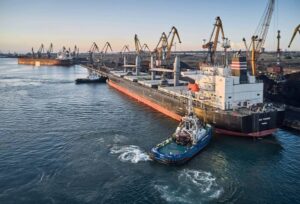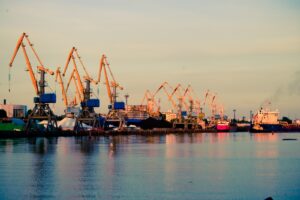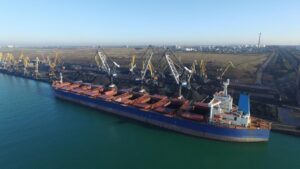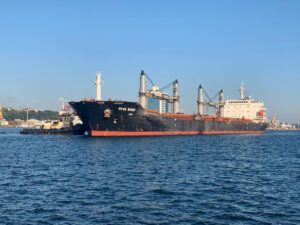
In January-March 2025, Ukrainian ports reduced the volume of cargo handled by 17.2% compared to the same period last year – to 23 million tons.
“In the first quarter of 2025, Ukrainian ports handled 23 million tons of cargo… For comparison, in the first quarter of 2024, Ukrainian ports handled 27.8 million tons of cargo, 4.8 million tons more than this year,” the state-owned Ukrainian Sea Ports Authority (USPA) said on Facebook on Wednesday.
“The decrease in cargo turnover is due to the reduction of farmland and a decline in production in export-oriented industries, in particular metallurgy, which exported up to 80% of its products before the war,” the USPA said.
It is noted that global cargo transshipment is also declining due to market volatility and logistics disruptions.
According to the report, the largest volumes of cargo were handled by the ports of Greater Odesa. Since the beginning of 2025, they have handled 20.7 million tons of cargo: Pivdennyi port – 10.6 million tons, Chornomorskyi port – 6.6 million tons, Odesskyi port – 3.5 million tons.
The ports of Izmail, Reni and Ust-Dunaisk in the Danube region handled over 2.3 million tons of cargo.
Despite the shelling and threats from the Russian army, the ports continue to operate steadily thanks to the coordinated work of port workers. The Armed Forces of Ukraine and the Navy of the Armed Forces of Ukraine ensure the safety of navigation, the USPA emphasized.
Earlier, Oleksiy Kuleba, Vice Prime Minister for the Restoration of Ukraine and Minister of Community and Territorial Development, said that as of April, 116 million tons of cargo had been transported through the Ukrainian sea corridor, including almost 73 million tons of grain. In early March, the Ministry of Development reported that 106 million tons of cargo had been transported through the Ukrainian sea corridor, including almost 70 million tons of grain.

Private companies are building new terminals in deep-water ports despite the surplus of transshipment capacity in 2024-2025 marketing year (MY), said Yuriy Vaskov, former deputy minister of development of grommads, territories and infrastructure (Ministry of Development).
“Regarding seaports today we have a surplus of transshipment capacity, but it is a difficult 2024-20525 marketing year … Even in the period of surplus capacity, several companies are building new terminals in deep-water ports, grain terminals. But, unfortunately, still do not have the opportunity to build their own berthing facilities on the lands of the water fund,” he said at the conference ‘Agro Sector 2025: Challenges and Opportunities in the New Realities’, organized by the analytical center We Build Ukraine on Thursday.
According to Vaskov, to increase the flow of private investment in the construction of port infrastructure, changes in legislation are needed, in particular, government decisions that will regulate the issue of construction on water fund lands.
“Tens, maybe even hundreds of millions of dollars now cannot be invested, I emphasize, in private business solely because of the uncertainty of this procedure,” Vaskov emphasized.

Companies from the United Arab Emirates (UAE) are ready to invest in the production of processed foods, grain transshipment and port development, the Ministry of Agrarian Policy and Food has reported.
According to the ministry, during a working visit to Saudi Arabia, Minister of Agrarian Policy and Food Vitaliy Koval and a government delegation headed by First Deputy Prime Minister and Minister of Economy Yulia Svyrydenko met with more than 20 leading UAE companies. Among them are port operators, investment, agricultural and trading companies interested in import and export cooperation with Ukraine.
“Ukraine and the United Arab Emirates have opened a new page in economic partnership. Among the UAE companies there are those that are ready to enter the Ukrainian market. In particular, to invest in the production of processed products, such as oilseeds, rapeseed, soybeans. As well as grain transshipment and port infrastructure development,” Koval said.
The Minister emphasized that the Ukrainian agricultural sector is already actively working with the UAE. In 2024, we exported more than $197 million worth of agricultural products. Among the most popular products were fats and oils of animal or vegetable origin, meat and edible offal, cereals, vinegar, etc.
As reported, the Comprehensive Economic Partnership Agreement between Ukraine and the UAE was signed in Abu Dhabi on February 17. It provides for free trade between the two countries and liberalization of access to the UAE market for Ukrainian agricultural products, including duty-free supplies of beef, lamb, dairy and processed foods. In addition, the Saudi side has expressed interest in joint development of beef cattle breeding and production of organic products.

In January-July 2024, Ukrainian ports increased their transshipment volume by 1.7 times compared to the same period in 2023 – up to 59.9 million tons, according to the Ukrainian Sea Ports Authority (USPA).
“According to the operational data of USPA for January-July 2024, the ports of Ukraine handled 59.9 million tons of cargo, compared to 34.4 million tons in 2023,” the USPA said on its Facebook page on Monday.
In July, 7 million tons were handled, the same as in June. This figure exceeds the volume handled by ports in July 2023 by 2.2 times.
More than half (4.2 mln tons) was accounted for by agricultural products exported to 46 countries.
Earlier it was reported that amid an increase in transshipment volumes in the Black Sea ports and a decrease in the Danube ports in January-June 2024, Ukrainian ports increased transshipment volumes by 1.6 times compared to the same period in 2023, to 53 million tons.

Ukrainian ports handled 37.7 million tons in January-April, up 1.7 times compared to the same period in 2023, the Ukrainian Sea Ports Authority (USPA) reported on Facebook on Wednesday.
In April, port operators handled 9.9 million tons of cargo in seaports, almost twice as much as in the same period in 2023, the USPA said in a statement.
It is indicated that the largest share in April is the processing of grain cargo – 6.3 million tons against 3.9 million tons in 2023.
The cargo turnover of the Black Sea ports, thanks to the Ukrainian sea corridor, amounted to 7.7 million tons in April, of which 5.1 million tons were the products of Ukrainian farmers, the report says.
Earlier it was reported that since August 2023, the sea corridor created by the Navy has exported almost 45 million tons of cargo to 44 countries.

Eleven bulkers carrying nearly 178,000 tonnes of agricultural products left Ukrainian ports on Thursday after receiving permission from the Joint Coordination Center (JCC).
“The Joint Coordination Center (JCC) reports that eleven vessels left Ukrainian ports today carrying a total of 177,950 metric tonnes of grain and other food products under the Black Sea Grain Initiative,” the center said.
They include six Turkey-bound vessels: the White Star (7,800 tonnes of barley), the Magnolia (6,600 tonnes of sunflower oil), the Hasan G (6,500 tonnes of peas), the Mera (6,300 tonnes of sunflower oil), the Sea Star (4,950 tonnes of wheat), and the Anastasia (3,700 tonnes of wheat), it said.
The Silver Lady vessel is carrying 49,100 tonnes of wheat to Spain, the Falcon S 33,000 tonnes of corn to Romania, the Zhe Hai 505 is heading to Algeria with 28,500 tonnes of wheat on board, the Serenity Ibtihaj is carrying 27,200 tonnes of corn to Israel, and the Umit G is heading to Greece with 4,300 tonnes of wheat aboard.
“Grains that reach a destination may go through processing and be trans-shipped to other countries,” the JCC said.
“As of October 6, the total tonnage of grain and other foodstuffs exported from the three Ukrainian ports is 6,372,498 metric tonnes. A total of 584 voyages (302 inbound and 282 outbound) have been enabled so far,” it said.